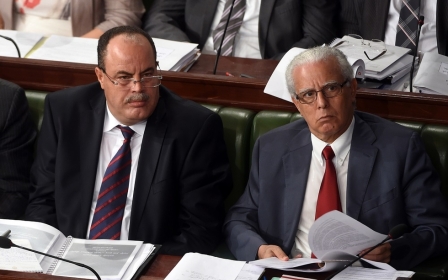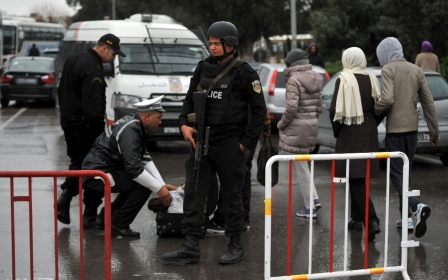Crisis erupts in Tunisia's ruling party as violence breaks out between factions

Tunisia's governing party is in crisis after it cancelled a meeting of its founding body following the eruption of violence at a meeting between opposing factions of the party in the city of Hammamat.
While President Beji Caid Essebsi sent an invitation to all Nidaa Tounes deputies to meet at the Carthage Palace on Tuesday to discuss incidents at the meeting of Nidaa Tounes’ executive board on Sunday, his intervention reportedly failed to bring the different factions together.
The violence erupted between a faction close to Secretary General Mohsen Marzouk and another sided with the president's son Hafedh Essebsi. Young men armed with wooden clubs prevented dissident party members from entering the leadership meeting.
Loyalists to Marzouk believe the president is attempting to install a family dynasty to rule the country through his son, who they accuse of encouraging the violence, reported the Independent.
Following the brawl, the party's executive bureau, representing Marzouk and his faction, released a statement blaming the attacks on Hafedh Essebsi, cabinet director Ridha Belhaj and a member of the party’s political bureau.
“This is a fascist attack by militias that are alien to the party aims and only want to prevent this meeting from taking place,” read the statement.
The statement condemned “some” of the party’s leaders for inciting violence in an attempt to “take over the party” and restructure it, while supporters of Essebsi accused Marzouk of harbouring presidential ambitions.
The rivalries underlying Sunday's violence have long been simmering within the party.
Observers say the dispute is pitting supporters of the president and his son, against liberal party members, at least 35 of whom are close to forming a breakaway party of their own, reported the Independent.
Several members of the party spoke out about the violence and accused one another of assault.
Executive bureau member Kacim Makhlouf accused resigned member of executive office Hedi Benzarti of assaulting him on Sunday by submitting a formal complaint to the security authorities, reported Tunisia Alive.
Nidaa Tounes's executive director Boujemaa Remili also said he was prevented from entering the hotel and forced to leave altogether, according to Tunisia Live.
Party members who declined to attend the Carthage meeting on Tuesday also spoke of their dismay.
Party deputy Sabrine Goubantini reportedly said on national radio Shems FM: “I will not attend the meeting, as holding such a meeting is useless.”
Similarly Mamoghli Chokri, a member of the party’s executive board wrote on social media: “Today Nidaa Tounes died. The party no longer exists as we know it. There will be a split. The parliamentary group will be divided into two and the government will likely fall. Ennahda, by default, will become the first party in the country.”
“Believe me, even the, (pre-revolutionary parties) PSD and the RCD in their worst moments did not do this. For me, Nidaa is dead and buried. The only issue left is the decision whether to exclude the scum, or create a new party.”
Commenting on the incidents, Tunisian political analyst Youssef Cherif told Tunisia Live: “The members of Nidaa Tounes have come to believe in the death of their own party. It is unlikely that they will unite and address these disputes, so a split – like that experienced by the Congress for the Republic (CPR) experienced in 2012 and 2013 – is inevitable.”
“It also appears that 30 deputies of the party are due to resign, giving Ennahda a parliamentary majority.”
Nidaa won 85 out of 217 seats in parliamentary elections last October after campaigning on a strongly anti-Islamist platform and defeating the Ennahda party.
Observers are already pointing toward a potential strengthening of the Ennahda party if Nidaa splits.
Nidaa's founding body was scheduled to meet to agree on a date for holding the party’s first congress, which was previously postponed due to splits in the fractious party.
Middle East Eye propose une couverture et une analyse indépendantes et incomparables du Moyen-Orient, de l’Afrique du Nord et d’autres régions du monde. Pour en savoir plus sur la reprise de ce contenu et les frais qui s’appliquent, veuillez remplir ce formulaire [en anglais]. Pour en savoir plus sur MEE, cliquez ici [en anglais].




